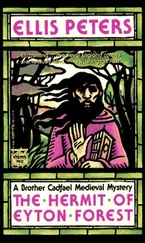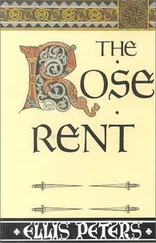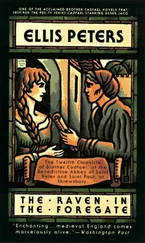Ellis Peters - The Devil's Novice
Здесь есть возможность читать онлайн «Ellis Peters - The Devil's Novice» весь текст электронной книги совершенно бесплатно (целиком полную версию без сокращений). В некоторых случаях можно слушать аудио, скачать через торрент в формате fb2 и присутствует краткое содержание. Жанр: Старинная литература, на английском языке. Описание произведения, (предисловие) а так же отзывы посетителей доступны на портале библиотеки ЛибКат.
- Название:The Devil's Novice
- Автор:
- Жанр:
- Год:неизвестен
- ISBN:нет данных
- Рейтинг книги:3 / 5. Голосов: 1
-
Избранное:Добавить в избранное
- Отзывы:
-
Ваша оценка:
- 60
- 1
- 2
- 3
- 4
- 5
The Devil's Novice: краткое содержание, описание и аннотация
Предлагаем к чтению аннотацию, описание, краткое содержание или предисловие (зависит от того, что написал сам автор книги «The Devil's Novice»). Если вы не нашли необходимую информацию о книге — напишите в комментариях, мы постараемся отыскать её.
The Devil's Novice — читать онлайн бесплатно полную книгу (весь текст) целиком
Ниже представлен текст книги, разбитый по страницам. Система сохранения места последней прочитанной страницы, позволяет с удобством читать онлайн бесплатно книгу «The Devil's Novice», без необходимости каждый раз заново искать на чём Вы остановились. Поставьте закладку, и сможете в любой момент перейти на страницу, на которой закончили чтение.
Интервал:
Закладка:
The Devil’s Novice
Ellis Peters
The Eighth Chronicle of Brother Cadfael
Contents
^
CHAPTER ONE
CHAPTER TWO
CHAPTER THREE
CHAPTER FOUR
CHAPTER FIVE
CHAPTER SIX
CHAPTER SEVEN
CHAPTER EIGHT
CHAPTER NINE
CHAPTER TEN
CHAPTER ELEVEN
CHAPTER TWELVE
CHAPTER THIRTEEN
EBook Design Group [EDG] digital edition v1 HTML
v2 HTML – January 3,2003
FAWCETT CREST • NEW YORK
A Fawcett Crest Book
Published by Ballantine Books
Copyright © 1983 by Ellis Peters
All rights reserved under International and Pan-American Copyright Conventions.
Published in the United States by Ballantine Books, a division of Random House, Inc., New York.
First published in Great Britain by Macmillan London Limited, 1983
Library of Congress Catalog Card Number 83-63300
ISBN 0-449-20701-3
This edition published by arrangement with William Morrow and Company, Inc.
First Ballantine Books Edition: February 1986
Second Printing: February 1987
CHAPTER ONE
^ »
In the middle of September of that year of Our Lord, 1140, two lords of Shropshire manors, one north of the town of Shrewsbury, the other south, sent envoys to the abbey of Saint Peter and Saint Paul on the same day, desiring the entry of younger sons of their houses to the Order.
One was accepted, the other rejected. For which different treatment there were weighty reasons.
“I have called you few together,” said Abbot Radulfus, “before making any decision in this matter, or opening it to consideration in chapter, since the principle here involved is at question among the masters of our order at this time. You, Brother Prior and Brother Sub-Prior, as bearing the daily weight of the household and family, Brother Paul as master of the boys and novices, Brother Edmund as an obedientiary and a child of the cloister from infancy, to advise upon the one hand, and Brother Cadfael, as a conversus come to the life at a ripe age and after wide venturings, to speak his mind upon the other.”
So, thought Brother Cadfael, mute and passive on his stool in the corner of the abbot’s bare, wood-scented parlour, I am to be the devil’s lawman, the voice of the outer world. Mellowed through seventeen years or so of a vocation, but still sharpish in the cloistered ear. Well, we serve according to our skills, and in the degrees allotted to us, and this may be as good a way as any. He was more than a little sleepy, for he had been outdoors between the orchards of the Gaye and his own herb garden within the pale ever since morning, between the obligatory sessions of office and prayer, and was slightly drunk with the rich air of a fine, fat September, and ready for his bed as soon as Compline was over. But not yet so sleepy that he could not prick a ready ear when Abbot Radulfus declared himself in need of counsel, or even desirous of hearing counsel he yet would not hesitate to reject if his own incisive mind pointed him in another direction.
“Brother Paul,” said the abbot, casting an authoritative eye round the circle, “has received requests to accept into our house two new devotionaries, in God’s time to receive the habit and the tonsure. The one we have to consider here is from a good family, and his sire a patron of our church. Of what age, Brother Paul, did you report him?”
“He is an infant, not yet five years old,” said Paul.
“And that is the ground of my hesitation. We have now only four boys of tender age among us, two of them not committed to the cloistral life, but here to be educated. True, they may well choose to remain with us and join the community in due time, but that is left to them to decide, when they are of an age to make such a choice. The other two, infant oblates given to God by their parents, are already twelve and ten years old, and are settled and happy among us, it would be ill-done to disturb their tranquillity. But I am not easy in my mind about accepting any more such oblates, when they can have no conception of what they are being offered or, indeed, of what they are being deprived. It is joy,” said Radulfus, “to open the doors to a truly committed heart and mind, but the mind of a child barely out of nurse belongs with his toys, and the comfort of his mother’s lap.”
Prior Robert arched his silver eyebrows and looked dubiously down his thin, patrician nose. “The custom of offering children as oblates has been approved for centuries. The Rule sanctions it. Any change which departs from the Rule must be undertaken only after grave reflection. Have we the right to deny what a father wishes for his child?”
“Have we—has the father—the right to determine the course of a life, before the unwitting innocent has a voice to speak for himself? The practice, I know, is long established, and never before questioned, but it is being questioned now.”
“In abandoning it,” persisted Robert, “we may be depriving some tender soul of its best way to blessedness. Even in the years of childhood a wrong turning may be taken, and the way to divine grace lost.”
“I grant the possibility,” agreed the abbot, “but also I fear the reverse may be true, and many such children, better suited to another life and another way of serving God, may be shut into what must be for them a prison. On this matter I know only my own mind. Here we have Brother Edmund, a child of the cloister from his fourth year, and Brother Cadfael, conversus after an active and adventurous life and at a mature age. And both, as I hope and believe, secure in commitment. Tell us, Edmund, how do you look upon this matter? Have you regretted ever that you were denied experience of the world outside these walls?”
Brother Edmund the infirmarer, only eight years short of Cadfael’s robust sixty, and a grave, handsome, thoughtful creature who might have looked equally well on horseback and in arms, or farming a manor and keeping a patron’s eye on his tenants, considered the question seriously, and was not disturbed. “No, I have had no regrets. But neither did I know what there might be worth regretting. And I have known those who did rebel, even wanting that knowledge. It may be they imagined a better world without than is possible in this life, and it may be that I lack that gift of imagination. Or it may be only that I was fortunate in finding work here within to my liking and within my scope, and have been too busy to repine. I would not change. But my choice would have been the same if I had grown to puberty here, and made my vows only when I was grown. I have cause to know that others would have chosen differently, had they been free.”
“That is fairly spoken,” said Radulfus. “Brother Cadfael, what of you? You have ranged over much of the world, as far as the Holy Land, and borne arms. Your choice was made late and freely, and I do not think you have looked back. Was that gain, to have seen so much, and yet chosen this small hermitage?”
Cadfael found himself compelled to think before he spoke, and beneath the comfortable weight of a whole day’s sunlight and labour thought was an effort. He was by no means certain what the abbot wanted from him, but had no doubt whatever of his own indignant discomfort at the notion of a babe in arms being swaddled willy-nilly in the habit he himself had assumed willingly.
“I think it was gain,” he said at length, “and moreover, a better gift I brought, flawed and dinted though it might be, than if I had come in my innocence. For I own freely that I had loved my life, and valued high the warriors I had known, and the noble places and great actions I had seen, and if I chose in my prime to renounce all these, and embrace this life of the cloister in preference to all other, then truly I think I paid the best compliment and homage I had to pay. And I cannot believe that anything I hold in my remembrance makes me less fit to profess this allegiance, but rather better fits me to serve as well as I may. Had I been given in infancy, I should have rebelled in manhood, wanting my rights. Free from childhood, I could well afford to sacrifice my rights when I came to wisdom.”
Читать дальшеИнтервал:
Закладка:
Похожие книги на «The Devil's Novice»
Представляем Вашему вниманию похожие книги на «The Devil's Novice» списком для выбора. Мы отобрали схожую по названию и смыслу литературу в надежде предоставить читателям больше вариантов отыскать новые, интересные, ещё непрочитанные произведения.
Обсуждение, отзывы о книге «The Devil's Novice» и просто собственные мнения читателей. Оставьте ваши комментарии, напишите, что Вы думаете о произведении, его смысле или главных героях. Укажите что конкретно понравилось, а что нет, и почему Вы так считаете.












